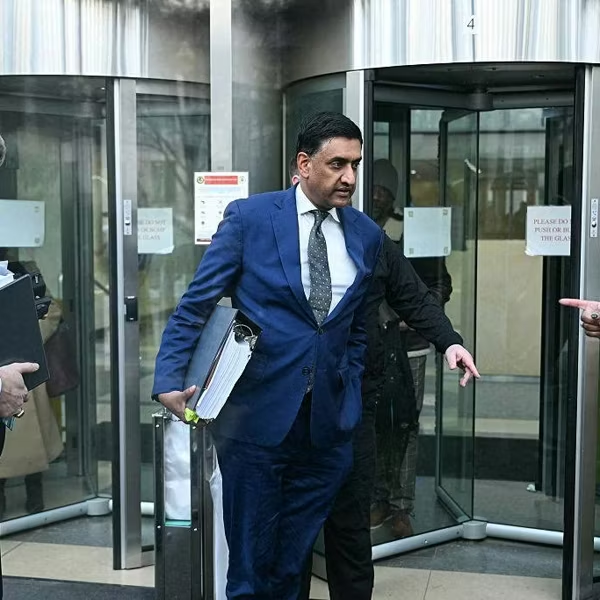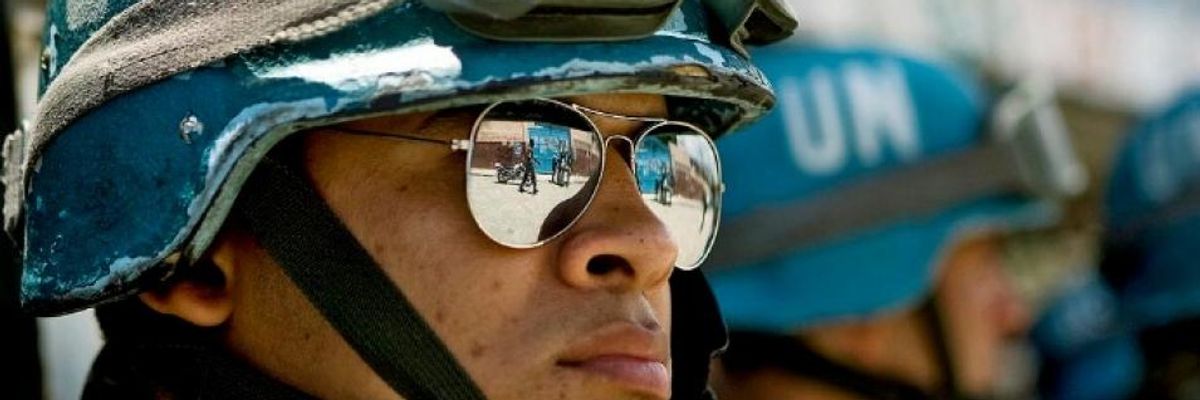A Haitian woman was selling charcoal on the empty edges of her small town when a white, uniformed United Nations peacekeeper offered her a lift in his marked vehicle. He raped her shortly after she got in. "I could not fight back," said Marie Badeau (a pseudonym) when I interviewed her in 2016, more than four years after the rape. "I felt outside of my body like I did not have all my senses."
While the U.N. can investigate allegations of sexual abuse and rape, peacekeeper accountability is up to the country that sends the troops. As a result, prosecutions have been rare even after media coverage and outrage.
After we talked, she introduced me to her daughter conceived from the rape. The four-year-old had notably paler skin and hair than Badeau. "I just tell people it's none of their business... when they look at her funny," she said.
Though Badeau loves her daughter unconditionally, the young mother's depression deepened whenever the girl complained of hunger.
An academic paper published in December by the journal International Peacekeeping suggests that Badeau is one of many poor Haitian women struggling with the long-term emotional and financial consequences of raising a child born from a peacekeeper father. The women were poor to begin with and find themselves even worse off now. Of the 2,500 community members interviewed by the researchers about living in towns with peacekeepers, 10 percent raised--without prompting--the issue of children fathered by the soldiers. The notoriety of the many nicknames for these children suggest both their prevalence and stigmatization, the researchers said.
For years, the Associated Press and other media outlets have published credible reports of sexual abuse and exploitation by the U.N. peacekeeping force in Haiti, which concluded its operations in 2017. The details are shocking.
"Sexual exploitation and abuse" is a broad term that includes crimes like rape but also violations of the U.N.'s ban on any sexual relationships that include "abuse of position of vulnerability," which essentially covers the local population everywhere U.N. peacekeepers deploy. Poverty, conflict, and chaos all make women and girls profoundly vulnerable to abuse by U.N. soldiers. Stigma, along with steep barriers to obtaining contraception and safe abortions (in Haiti abortion is completely prohibited), make even consensual relationships more dangerous.
Haiti is just one of many countries where peacekeepers have raped women and girls, or sexually exploited them in exchange for food or support. My colleagues have also reported on rape by African Union forces in Somalia, French, and U.N. peacekeepers in Central African Republic and U.N. troops in the Democratic Republic of Congo. While the U.N. can investigate allegations of sexual abuse and rape, peacekeeper accountability is up to the country that sends the troops. As a result, prosecutions have been rare even after media coverage and outrage.
In recent years, the U.N. has stepped up its efforts to tackle the issue and push on the troop contributing countries. In 2015, the U.N. began publishing the nationalities of soldiers alleged to have sexually exploited and abused women and girls. It also established a trust fund and programs for psychological care, job training, and other services for victims, including children fathered by peacekeepers. In 2017, the U.N. established a global "Victim Rights Advocate" and embedded victim advocates within peacekeeping missions. Annual reports and logged case updates are publicly available.
Badeau told me she was too ashamed to report her situation and didn't know how she could. She had not sought out post-rape care for similar reasons. The U.N.'s new resources for survivors may explain the increase in reports, including older cases. Affordable or free legal assistance has improved in some places but remains patchy.
The need to better provide rape and sexual abuse survivors with long-term psychological assistance is well-established. Less clear is what the children born of rape or relationships with peacekeepers will need over the years to come. More research is needed. Children of peacekeeper fathers should have the opportunity to obtain their biological parent's nationality, a rare occurrence but one that has happened at least once, in Uruguay.
It's crucial that the U.N., the media, and civil society groups continue to exert pressure on countries that contribute peacekeepers to respond to abuse allegations more seriously and more transparently. Otherwise, prosecutions of crimes will remain the exception.
U.N. efforts have led to some improvements by troop and police contributing countries such as more training and troop vetting ahead of deployment. Some countries have tried new approaches. South Africa holds courts-martial in the same locale as the victim, to improve access to witnesses and evidence, and ensure that justice is seen to be done.
But countries need to do more. The U.N. has requested they appoint paternity focal points in the forces who can collect DNA and help mothers negotiate the legal system of the contributing country. Most don't. Some countries' legal systems need to be updated to better hold soldiers accountable for their behavior when deployed. For example, some governments still do not accept paternity claims. And more women police and soldiers should be included in peacekeeping forces.
In the meantime, it's crucial that the U.N., the media, and civil society groups continue to exert pressure on countries that contribute peacekeepers to respond to abuse allegations more seriously and more transparently. Otherwise, prosecutions of crimes will remain the exception.
For decades, desperate civilians have sought U.N. peacekeepers to alleviate some of the worst horrors of our times. Survivors of violence, displacement, and poverty shouldn't have to fear that those charged with protecting them will contribute to their suffering.




